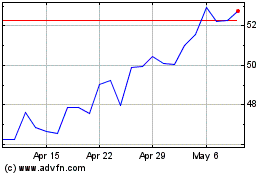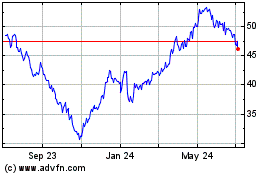Regional Airlines Seek Reduced Regional Airlines Seek Reduced Regional Airlines Seek Reduced
December 01 2015 - 5:40PM
Dow Jones News
U.S. regional airlines are seeking to persuade regulators to
roll back minimum-experience requirements before many future
co-pilots are hired, while proposing to significantly enhance
training and supervision once they start flying passengers.
The initiative, which hasn't been reported before, lays out a
potential alternate path to the cockpit for starting aviators,
including time sitting in airliner jump seats as observers,
more-frequent proficiency checks by carriers, beefed-up
stall-recovery training and a year or more of formal mentoring by
senior pilots. Primary elements of the plan were laid out in draft
documents and interviews with officials of the Regional Airline
Association, the trade group advocating such changes.
With regional carriers pledging to step up both initial and
recurrent training programs for new co-pilots, or first officers,
the goal is to raise the safety bar while fixing "a broken
pipeline" that is already producing too few acceptable applicants,
according to Faye Malarkey Black, the association's president.
"We want all new pilots to be better trained," she said in an
interview Tuesday, adding that proponents "want to see this as an
industrywide solution" that is "safer because we leave nothing to
chance."
Aiming to challenge the currently mandated 1,500-hour flight
time standard for all U.S. airline pilots -- perhaps the most
controversial issue confronting the country's carriers -- the
association over the past few months quietly assembled a package
designed to alleviate what its members describe as a worsening
shortage of would-be first officers.
Expected to be formally presented to the Federal Aviation
Administration after more details are hammered out, the current
proposal doesn't specify alternate flight time requirements for
candidates who would participate in individual airline-run
programs. At this point FAA policy makers—as well as an
agency-sponsored labor-industry advisory committee—appear opposed
to dramatic reductions in mandatory experience for average new
cockpit hires.
Under provisions previously endorsed by lawmakers and
regulators, former military pilots and graduates of four-year
college or university aviation programs already can cut
minimum-experience requirements by hundreds of hours.
The proposal takes a different tack than another recently
disclosed attempt, by JetBlue Airways Corp., to recruit students
without any cockpit experience and immerse them in airline-style
training to show proficiency can be achieved with far fewer hours
than the FAA and Congress now demand.
In the U.S., fledgling pilots usually pay to log hours in
smaller aircraft in order to apply for an airline job and then
receive training on specific commercial aircraft. But like other
critics of the existing regulatory structure, regional airline
leaders have argued many prospective pilots are discouraged by the
fact that it typically takes several years and often more than
$120,000 to build up the necessary hours.
"I don't think I have a single carrier that has not been
impacted" by dwindling pilot availability, said Ms. Black, whose
association represents some two dozen regional carriers across
North America. They operate roughly half of all passenger flights
nationwide.
Details of the package called ACE, standing for air carrier
enhanced training, have been disclosed in briefings to lawmakers
and regulators.
The plan takes students with time in small airplanes and then
subjects them to a training technique widely relied on by foreign
airlines but traditionally shunned in the U. S: requiring trainees
to sit in jump seats as a way to become familiar with cockpit
practices and air-traffic control procedures.
In addition, new co-pilots would be subject to proficiency
checks every six months, rather than today's typical annual
schedule. They would fly passengers under the direct supervision of
senior captains, called check airmen, for twice as long as they
generally do; and would be subject to continuing evaluations by
regular captains—and data would be collected from these assessments
-- during their first year of employment.
The ACE package also includes more training emphasis on
hot-button safety topics such as improving manual flying skills,
responding to high-altitude stalls, recovering from extreme upsets
and better understanding aerodynamic and human factors
principles.
But the Air Line Pilots Association, the largest North American
pilot union, remains opposed to wholesale reductions in experience
for entry-level aviators. President Tim Canoll has said that
preserving the 1,500-hour mandate is one of ALPA's top priorities.
And for years, union leaders have strongly urged FAA officials to
resist industry pressure to lower that threshold.
According to Ms. Black, regional carriers gradually have changed
some training regimes to reflect greater knowledge and causes of
recent accidents. "It is a collaborative effort" with labor and
regulators, she said, and "we've done some due diligence" to pave
the way for the eventual final proposal.
Write to Andy Pasztor at andy.pasztor@wsj.com
Subscribe to WSJ: http://online.wsj.com?mod=djnwires
(END) Dow Jones Newswires
December 01, 2015 17:25 ET (22:25 GMT)
Copyright (c) 2015 Dow Jones & Company, Inc.
Delta Air Lines (NYSE:DAL)
Historical Stock Chart
From Mar 2024 to Apr 2024

Delta Air Lines (NYSE:DAL)
Historical Stock Chart
From Apr 2023 to Apr 2024
